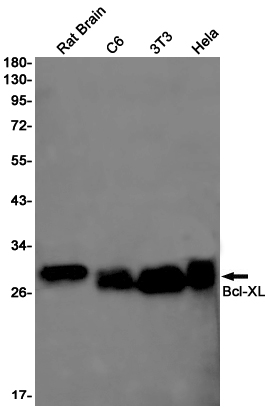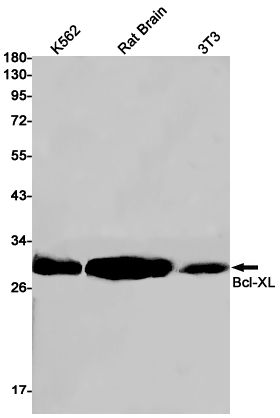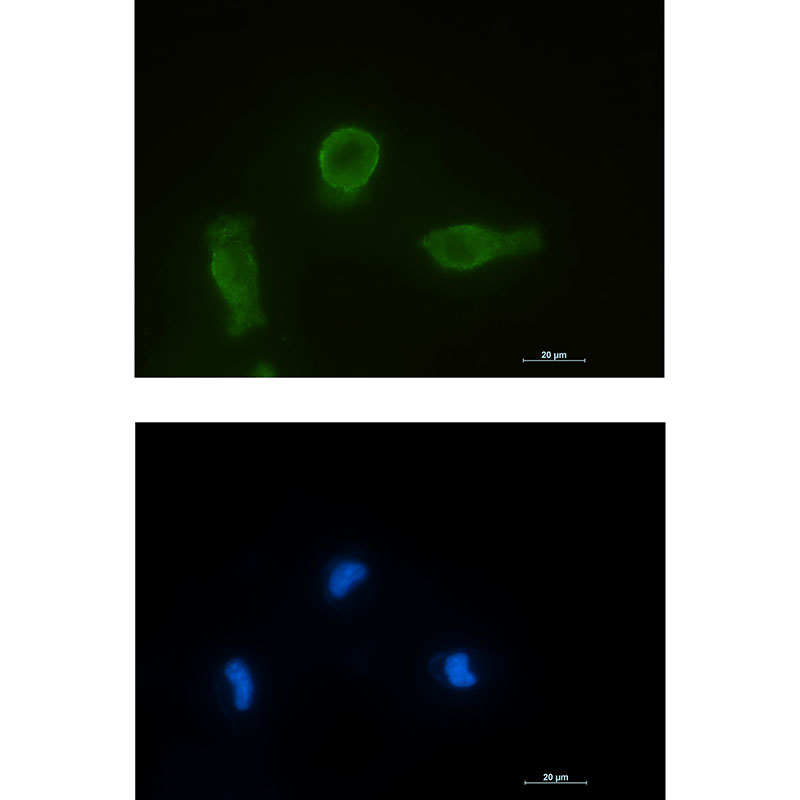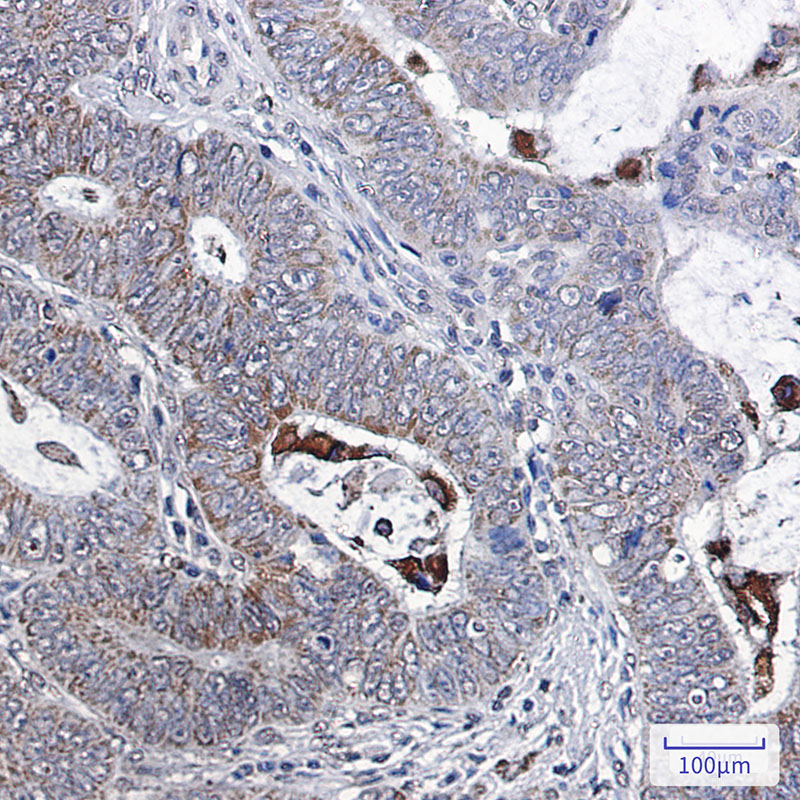



| WB | 咨询技术 | Human,Mouse,Rat |
| IF | 1/20 | Human,Mouse,Rat |
| IHC | 1/50-1/100 | Human,Mouse,Rat |
| ICC | 1/50-1/200 | Human,Mouse,Rat |
| FCM | 咨询技术 | Human,Mouse,Rat |
| Elisa | 咨询技术 | Human,Mouse,Rat |
| Aliases | BCL2L1; BCL2L; BCLX; Bcl-2-like protein 1; Bcl2-L-1; Apoptosis regulator Bcl-X |
| Entrez GeneID | 598 |
| WB Predicted band size | Calculated MW: 26 kDa; Observed MW: 30 kDa |
| Host/Isotype | Rabbit IgG |
| Antibody Type | Primary antibody |
| Storage | Store at 4°C short term. Aliquot and store at -20°C long term. Avoid freeze/thaw cycles. |
| Species Reactivity | Human,Mouse,Rat |
| Immunogen | Recombinant protein of human Bcl-XL |
| Formulation | Purified antibody in TBS with 0.05% sodium azide,0.05%BSA and 50% glycerol. |
+ +
以下是3-4篇关于Bcl-XL抗体的参考文献,简要概括内容:
1. **"Structure of Bcl-xL–Bak peptide complex: recognition between regulators of apoptosis"**
- **作者**: Sattler M, et al.
- **摘要**: 通过X射线晶体学解析Bcl-XL与Bak肽的复合物结构,揭示了Bcl-XL抑制凋亡的结构基础。研究使用Bcl-XL抗体验证蛋白表达及相互作用,为靶向药物设计提供依据(Science, 1997)。
2. **"Bcl-2 family: regulators of cell death"**
- **作者**: Cheng EH, et al.
- **摘要**: 综述Bcl-2家族蛋白(包括Bcl-XL)在细胞凋亡中的调控作用,强调抗凋亡蛋白Bcl-XL的功能及其实验中使用的特异性抗体在Western blot和免疫组化中的应用(PNAS, 1996)。
3. **"An inhibitor of Bcl-2 family proteins induces regression of solid tumours"**
- **作者**: Oltersdorf T, et al.
- **摘要**: 报道小分子抑制剂ABT-737通过靶向Bcl-XL等抗凋亡蛋白诱导肿瘤消退,研究中利用Bcl-XL抗体检测蛋白表达水平,验证药物作用机制(Nature, 2005)。
4. **"Immunohistochemical analysis of Bcl-xL expression in human tumors"**
- **作者**: Krajewski S, et al.
- **摘要**: 通过免疫组化分析多种肿瘤组织中Bcl-XL的表达水平,证明其高表达与癌症进展相关,所用Bcl-XL特异性抗体为临床预后评估提供工具(Cancer Research, 1994)。
以上文献涵盖结构研究、功能分析及临床应用,均涉及Bcl-XL抗体的实验验证。
**Background of Bcl-XL Antibody**
Bcl-XL, a member of the B-cell lymphoma 2 (Bcl-2) family, is a key anti-apoptotic protein that regulates mitochondrial outer membrane permeabilization (MOMP) to prevent programmed cell death. Structurally, it contains four Bcl-2 homology (BH) domains (BH1-BH4), with BH4 being critical for its pro-survival function. Bcl-XL localizes to the mitochondrial membrane, where it inhibits apoptosis by binding and neutralizing pro-apoptotic Bcl-2 family members like Bax and Bak, thereby blocking cytochrome *c* release and caspase activation.
Overexpression of Bcl-XL is frequently observed in cancers, contributing to tumor progression, metastasis, and resistance to chemotherapy or radiation. This makes Bcl-XL a therapeutic target and a biomarker for cancer prognosis. Antibodies targeting Bcl-XL are essential tools for detecting its expression levels in tissues or cells via techniques like Western blotting, immunohistochemistry (IHC), and flow cytometry. These antibodies help elucidate its role in apoptosis regulation, cancer biology, and drug resistance mechanisms.
In preclinical research, Bcl-XL-specific antibodies are also used to validate the efficacy of BH3 mimetics (e.g., ABT-263), which disrupt Bcl-XL interactions to restore apoptosis in malignant cells. However, targeting Bcl-XL therapeutically requires caution due to its physiological roles in platelet survival and neuronal maintenance. Overall, Bcl-XL antibodies remain vital for advancing cancer research and developing strategies to overcome treatment resistance.
×